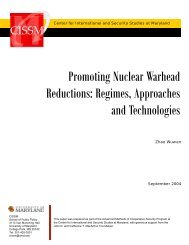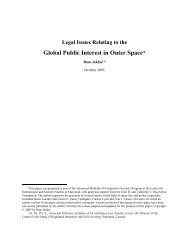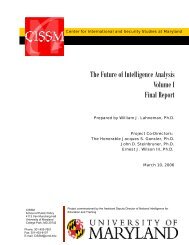A Reassurance-Based Approach to Space Security - Center for ...
A Reassurance-Based Approach to Space Security - Center for ...
A Reassurance-Based Approach to Space Security - Center for ...
- No tags were found...
Create successful ePaper yourself
Turn your PDF publications into a flip-book with our unique Google optimized e-Paper software.
Those countries who are primarily concerned about the space environment are lessworried than Russia and China about how the United States might use its superior militaryspace capabilities <strong>for</strong> strategic or tactical advantage. Instead, they are more concerned abouthow “irresponsible” space-faring nations might act in ways that would degrade the spaceenvironment <strong>for</strong> those not engaged in a competition <strong>for</strong> military advantage there. The EU’svoluntary code of conduct hopes <strong>to</strong> build on the less controversial aspects of spacecooperation, existing principles and best practices, but leaves the application of generalprinciples <strong>to</strong> specific situations <strong>for</strong> individual states <strong>to</strong> decide. The code couches the mostimportant new behavioral guidelines in environmentally friendly terms: avoid those actionsthat generate long-lasting space debris and those that otherwise damage or destroy spaceobjects unless done <strong>to</strong> reduce space debris or address imperative safety considerations.Such voluntary ef<strong>for</strong>ts <strong>to</strong> raise the standards <strong>for</strong> responsible space behavior mighthave seemed adequate in the 1990s, when most observers expected that the changingdemographics of space users would steadily decrease strategic conflicts and increaseincentives <strong>for</strong> cooperation on commercial, scientific, and human security applications. TheUnited States’ recent ef<strong>for</strong>ts <strong>to</strong> achieve comprehensive space dominance, though, havechanged the context such that China, Russia, and any number of other countries will not<strong>for</strong>eswear the ability <strong>to</strong> target satellites without legally binding reassurances about how theUnited States will develop and use its superior military space capabilities. Nor will theyprovide significantly greater transparency about their own space programs and plans unlessthey have much greater confidence that the in<strong>for</strong>mation will not be used against them.Some experts close <strong>to</strong> the Obama administration have recently proposedreconsidering whether additional legal agreements could help protect U.S. interests in space.In effect, they want <strong>to</strong> drop the principle added <strong>to</strong> the 2006 National <strong>Space</strong> Policy thatdirects the United States <strong>to</strong> categorically oppose all new legal regimes or other restrictions onU.S. access <strong>to</strong> or use of space, and return <strong>to</strong> the more open-minded position in all previousU.S. National <strong>Space</strong> Policies. 13 Like the Russians and Chinese, these U.S. experts argue thatadditional space arms control could enhance strategic stability. But instead of involvingcomprehensive prohibitions on weapons in space and on threats or use of <strong>for</strong>ce againstspace assets, these U.S. proposals involve only modest <strong>for</strong>ms of cooperation and maintain alargely adversarial approach <strong>to</strong> space security. For example, Bruce MacDonald, a <strong>for</strong>merClin<strong>to</strong>n administration official, has proposed that the United States should make deterrence,not military dominance, the primary principle guiding its space security policy and shouldconsider whether the costs and risks associated with space deterrence could be reducedbecause it had a public safety rather than a security rational, was conducted at a sufficiently low altitude so asnot <strong>to</strong> generate long-lasting space debris, and was handled in a more transparent manner. Independent analystshave estimated, though, that the probability of even one person being killed by the fumes was extraordinarilysmall, and there is no public evidence that the Bush administration placed any weight on the negativediplomatic and strategic consequences of demonstrating that a missile defense intercep<strong>to</strong>r could be rapidlyadapted <strong>for</strong> anti-satellite use.13 The 1996 National <strong>Space</strong> Policy specifies that the United States will conclude agreements governing activitiesin space that are “equitable, effectively verifiable, and enhance the security of the United States and our allies.”Even the Reagan administration’s 1982 National <strong>Space</strong> Policy said that the United States will consider specificarms control measures that were verifiable, equitable, and compatible with U.S. security but oppose generalprohibitions on military or intelligence uses of space.12







